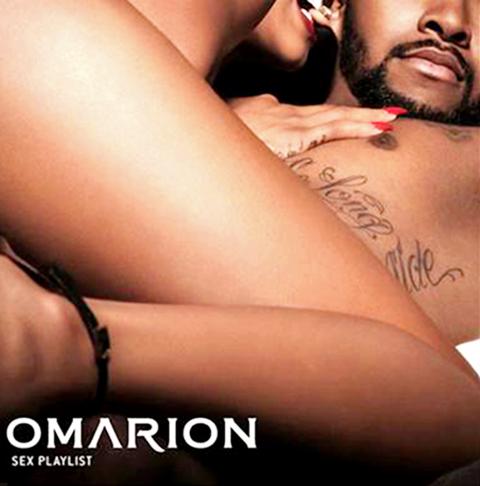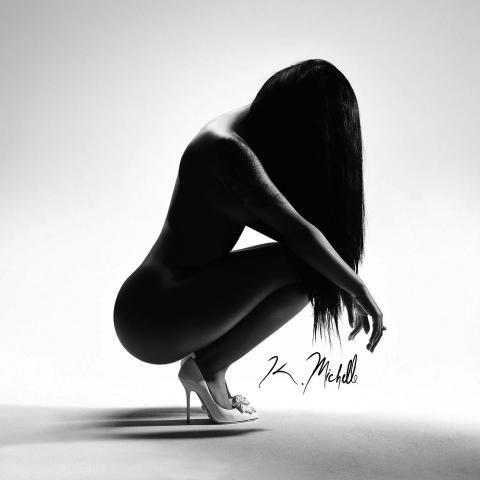Sex Playlist, Omarion, Maybach Music Group/ Atlantic
Perhaps the most preposterous part of the reality show Love & Hip Hop: Hollywood the first season of which concluded on VH1 last week, was the recurring pretense that actual music was being made. This show — the latest spinoff of a successful and entertaining franchise that details the affairs and fighting within groups of musicians and their hangers-on in various cities — is great soap opera, but has little to do with modern music-making.
This season’s Lothario, Yung Berg, may be something of a rising hit-maker these days. But the idea that the show’s stars, Hazel-E, or Masika, or even once-was Teairra Mari, might turn the opportunity of working with him — a narrative arc that spanned the whole season, with umpteen squabbles along the way — into musical relevance is far-fetched at best.

The record business is a great milieu for intrigue, but music is merely the occasion for drama on this show. And that’s fine, really. Shows like Love & Hip Hop have thrived by finding compelling personalities who are largely adjacent to fame — what they might not be able to achieve on the charts, they can certainly score on television.
But when artists with established talent choose to appear on shows like this, the calculus is different. Yes, steady exposure on a hit show is a huge asset, the sort of spotlight that record labels are decreasingly able to provide. But when the self you reveal on television begins to trump the self you put on record, is making albums even worth it anymore?
Anybody Wanna Buy a Heart?, K. Michelle, Atlantic

This season of Love & Hip Hop: Hollywood had more currently relevant artists than is typical of shows of this sort, namely the rapper Soulja Boy and Omarion, late of the boy band B2K and currently signed to Rick Ross’ label, Maybach Music Group. And every Monday night, after Love & Hip Hop, was K. Michelle: My Life, a lighthearted biographical reality show starring the pugnacious R&B singer K. Michelle, a graduate of Love & Hip Hop: Atlanta and a longtime soul queen aspirant.
Both K. Michelle and Omarion have new albums out, which is itself something of an accomplishment. That their time in the reality television trenches hasn’t damaged them irreparably is an accomplishment, too.
As a solo artist, post-B2K Omarion has never found steady footing. He has one transcendent song, Ice Box, from 2006, and a couple of sturdy albums, but not a reliable career.
While music may be his art, it is not his job on television. On Love & Hip Hop, he’s a responsible family man, mediating tensions between his girlfriend, who just gave birth to the couple’s first baby, and his mother. Only on a handful of occasions does he appear in a studio, or even seem particularly interested in music.
Maybe that’s a savvy choice. Most of the music-making on Love & Hip Hop is by amateurs. (So many scenes take place in studios, even ones that involve no recording of music — who’s paying for all this studio time?) But Sex Playlist, Omarion’s fourth album, is the work of a pro, albeit a conservative one.
Omarion has a sweet voice, though usually he applies it to unimaginative lyrics. Amid the negligible songs here are a couple of standouts. Post to Be, produced by DJ Mustard and Mike Free, is a chipper and cheeky song about romantic disloyalty, with Jhene Aiko playing a frisky retorter. And Don’t Leave, produced by Tank, is lovely and brooding, with hints of true desperation.
For Omarion, appearing on television is an opportunity to capitalize on old fame, and hopefully kick-start new fame. For K. Michelle, it’s been a lifeline. For years, her music career was marked by false starts. A powerful singer with shades of Mary J. Blige’s anguish, she had a few small hits, but no album, owing to private life problems that infected her professional life.
She needed an outlet, a precipitating event, and for her reality television was a welcome arrival. It played to her strengths — she’s voluble and prone to disagreements — but it also put her in the public eye in a way her music career, up until that point, never had.
Last year, she finally released a debut album, and this week she releases the follow-up, Anybody Wanna Buy a Heart? It’s less impressive than the first one, and too often her vocals are manipulated with Auto-Tune when she doesn’t need it.
But unlike Omarion, K. Michelle has a clear character, one she plays in both parts of her career an aggrieved and heartbroken woman, prone to bad choices and trying to do better.
Cry is about making a man jealous as retaliation: “You gon’ suffer for everything you did/You gon’ suffer, you gon’ suffer/I done took too much of this.” On Build a Man, she catalogs the men who let her down and wishes she could construct a new one from their worthy parts.
And years of being a target of gossip websites has paid off for K. Michelle. Drake Would Love Me is great clickbait soul, a song in which she aligns herself with hip-hop’s great emoter.
This isn’t the only music that comes from the Love & Hip Hop empire. In the season finale last week, the show advertised new songs by Fizz, who was Omarion’s bandmate in B2K, and Mari, who was signed to Roc-A-Fella, Jay Z’s label, as a teenager, but has been largely absent in the years since. If you dig hard enough, you can find the songs on iTunes, on Amazon, on Spotify. But they’re footnotes to the series, little more than plot points. Once the closing credits roll, they’re gone.

June 9 to June 15 A photo of two men riding trendy high-wheel Penny-Farthing bicycles past a Qing Dynasty gate aptly captures the essence of Taipei in 1897 — a newly colonized city on the cusp of great change. The Japanese began making significant modifications to the cityscape in 1899, tearing down Qing-era structures, widening boulevards and installing Western-style infrastructure and buildings. The photographer, Minosuke Imamura, only spent a year in Taiwan as a cartographer for the governor-general’s office, but he left behind a treasure trove of 130 images showing life at the onset of Japanese rule, spanning July 1897 to

One of the most important gripes that Taiwanese have about the Democratic Progressive Party (DPP) is that it has failed to deliver concretely on higher wages, housing prices and other bread-and-butter issues. The parallel complaint is that the DPP cares only about glamor issues, such as removing markers of Chinese Nationalist Party (KMT) colonialism by renaming them, or what the KMT codes as “de-Sinification.” Once again, as a critical election looms, the DPP is presenting evidence for that charge. The KMT was quick to jump on the recent proposal of the Ministry of the Interior (MOI) to rename roads that symbolize

In an interview posted online by United Daily News (UDN) on May 26, current Chinese Nationalist Party (KMT) Chairman Eric Chu (朱立倫) was asked about Taichung Mayor Lu Shiow-yen (盧秀燕) replacing him as party chair. Though not yet officially running, by the customs of Taiwan politics, Lu has been signalling she is both running for party chair and to be the party’s 2028 presidential candidate. She told an international media outlet that she was considering a run. She also gave a speech in Keelung on national priorities and foreign affairs. For details, see the May 23 edition of this column,

On the evening of June 1, Control Yuan Secretary-General Lee Chun-yi (李俊俋) apologized and resigned in disgrace. His crime was instructing his driver to use a Control Yuan vehicle to transport his dog to a pet grooming salon. The Control Yuan is the government branch that investigates, audits and impeaches government officials for, among other things, misuse of government funds, so his misuse of a government vehicle was highly inappropriate. If this story were told to anyone living in the golden era of swaggering gangsters, flashy nouveau riche businessmen, and corrupt “black gold” politics of the 1980s and 1990s, they would have laughed.